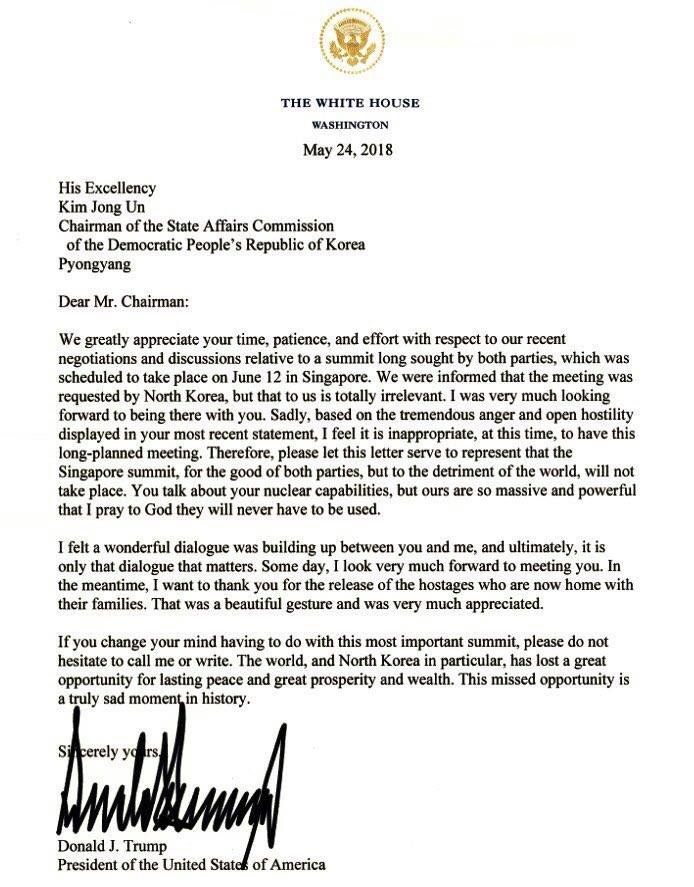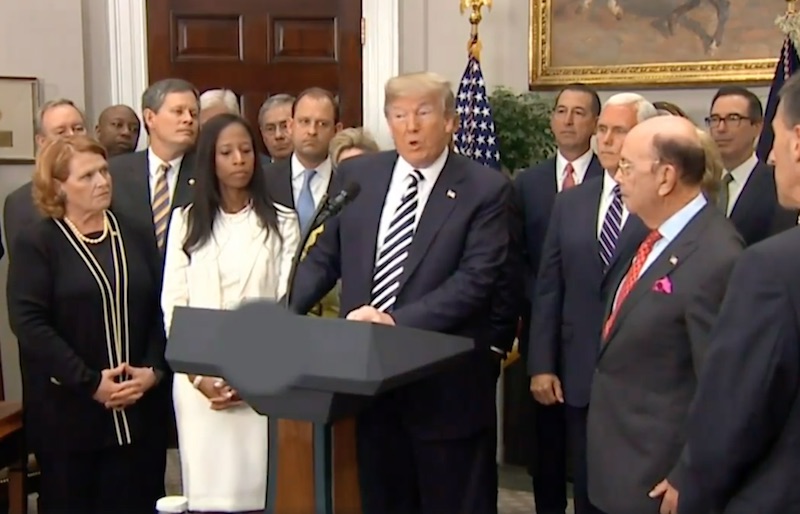Well, this was a plot twist. US President Donald Trump effectively terminated what would have been a historic summit with North Korea in Singapore, citing “tremendous anger” and “open hostility” displayed by the hermit kingdom.
The announcement arrived a day after Pyongyang hardened its rhetoric, calling comments by Vice President Mike Pence “ignorant and stupid”.
In a personal letter directed to North Korean leader Kim Jong Un, Trump even managed to toss in a jibe about the nuclear capabilities of the United States. “You talk about your nuclear capabilities, but ours are so massive and powerful that I pray to God they will never have to be used,” he wrote.

He said talks could still go ahead “at a later date”. Pyongyang’s immediate reaction to the sudden U-turn was conciliatory. First Vice Foreign Minister Kim Kye Gwan called Trump’s decision “unexpected” and “regrettable” but he left the door open for further diplomacy.
“The unilateral cancellation of the summit was unexpected and very regrettable,” said Kim in a statement carried by the North’s official Korean Central News Agency. “But we remain unchanged in our willingness to do everything we can for the peace and stability of the Korean Peninsula and of the humanity, so with a broad and open mind, we are willing to give the United States time and opportunity.”
Blindsided
The decision blindsided treaty ally South Korea, which until now had brokered a remarkable detente between Washington and Pyongyang.
South Korean President Moon Jae-in called the move “shocking and very regrettable” as he scrambled his national security team.
Seoul’s foreign ministry said US Secretary of State Mike Pompeo phoned his South Korean counterpart Kang Kyung-wha Friday morning and said the two nations should continue efforts to “create conditions” for talks with Pyongyang.
Separately, Unification Minister Cho Myoung-gyon said Seoul would continue talking to Kim’s regime which he said “remains sincere in implementing the agreement and making efforts on denuclearisation and peace building”.
UN Secretary-General Antonio Guterres urged the parties to keep talking, as did host Singapore, while Russia’s President Vladimir Putin held out hope that dialogue would resume and the talks would eventually take place.
Politically, Trump had invested heavily in the success of the planned summit. But as the date drew nearer, the gulf in expectations between the two sides became apparent. Washington has made it clear it wants to see the “complete, verifiable and irreversible denuclearization” of the North.
But Pyongyang has vowed it will never give up its nuclear deterrent until it feels safe from what it terms US aggression.
Stood up
White House aides — including its deputy chief of staff — had already traveled to Singapore for preparatory talks with their North Korean counterparts to iron out the details of the meeting.
Apparently, the North Korean officials never showed up to the meeting.
“They waited and they waited. The North Koreans never showed up. The North Koreans did not tell us anything — they simply stood us up,” a senior White House official told AFP, speaking on condition of anonymity.
The White House viewed North Korea’s objection to a routine US-South Korean joint military exercise — and its recent cancellation of a meeting with the South Koreans — as a breach of its commitments leading up to the summit.
It also was unhappy about the North’s failure to allow international observers to verify the dismantling of its Punggye-ri test site, the staging ground for all six of its nuclear tests which was buried inside a mountain near the border with China.
But the North’s Kim Kye Gwan countered that their angry statements were “just a backlash in response to harsh words from the US side that has been pushing for a unilateral denuclearisation”.
With text by AFP




